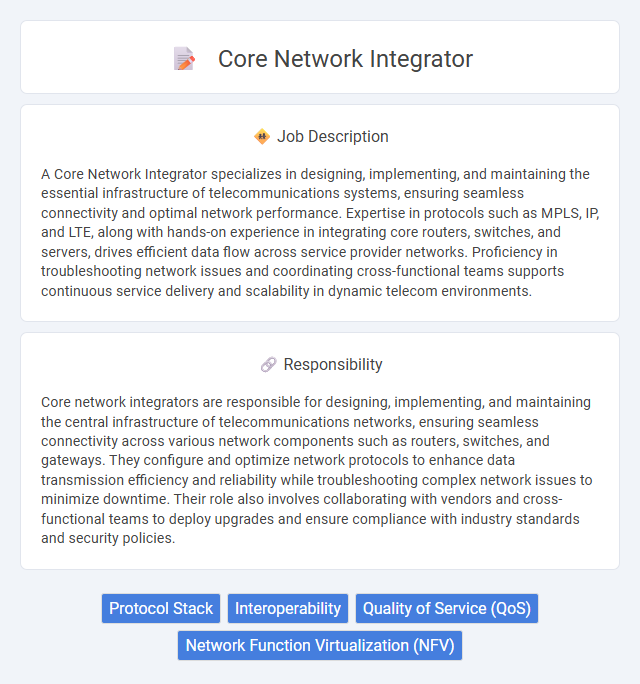
A Core Network Integrator specializes in designing, implementing, and maintaining the essential infrastructure of telecommunications systems, ensuring seamless connectivity and optimal network performance. Expertise in protocols such as MPLS, IP, and LTE, along with hands-on experience in integrating core routers, switches, and servers, drives efficient data flow across service provider networks. Proficiency in troubleshooting network issues and coordinating cross-functional teams supports continuous service delivery and scalability in dynamic telecom environments.
Individuals with strong analytical skills, problem-solving abilities, and a keen interest in telecommunications are likely suitable for a Core Network Integrator role. The job may demand working under pressure, handling complex technical tasks, and continuous learning, which might not appeal to those preferring routine or less collaborative environments. People comfortable with multitasking and adapting to evolving technologies probably have a higher chance of thriving in this position.
Qualification
Core network integrators require in-depth knowledge of telecommunications protocols such as MPLS, BGP, and OSPF, alongside proficiency in configuring and managing routers, switches, and firewalls. A bachelor's degree in computer science, information technology, or telecommunications engineering is commonly essential, complemented by certifications like Cisco CCNP, Juniper JNCIP, or equivalent vendor-specific qualifications. Experience with network design, troubleshooting complex connectivity issues, and expertise in 5G and LTE core network architecture significantly enhance a candidate's suitability for this role.
Responsibility
Core network integrators are responsible for designing, implementing, and maintaining the central infrastructure of telecommunications networks, ensuring seamless connectivity across various network components such as routers, switches, and gateways. They configure and optimize network protocols to enhance data transmission efficiency and reliability while troubleshooting complex network issues to minimize downtime. Their role also involves collaborating with vendors and cross-functional teams to deploy upgrades and ensure compliance with industry standards and security policies.
Benefit
Core network integrators likely provide significant benefits by enhancing communication system efficiency and reliability. Their expertise probably helps reduce downtime and optimize network performance, leading to cost savings for organizations. Companies may experience improved data handling and scalability, supporting business growth and technological advancements.
Challenge
Core network integrator roles often involve complex challenges related to ensuring seamless connectivity across diverse network technologies and infrastructures. Professionals in this field likely face the probability of encountering compatibility issues, requiring advanced problem-solving skills to optimize performance. Navigating rapid technological advancements demands continuous learning and adaptability to maintain efficient integration and network stability.
Career Advancement
Core network integrator roles involve designing, implementing, and maintaining complex telecommunications infrastructures, essential for seamless connectivity and network performance. Mastery in network protocols, hardware configurations, and troubleshooting accelerates career progression toward senior network architect or project manager positions. Continuous upskilling in emerging technologies such as 5G, SDN, and network virtualization significantly enhances advancement opportunities in the core network integration field.
Key Terms
Protocol Stack
A Core Network Integrator specializes in assembling and optimizing telecommunication systems by configuring and managing protocol stacks such as TCP/IP, SCTP, and SIGTRAN to ensure seamless data transmission across 4G and 5G networks. Expertise in layering protocols from the physical to the application level enables effective interoperability between network elements like MME, SGW, and PGW. Proficiency in protocol stack debugging and performance tuning supports enhanced network reliability, scalability, and quality of service.
Interoperability
Core network integrators specialize in ensuring seamless interoperability between diverse communication systems, protocols, and technologies within telecommunication infrastructures. Their expertise involves configuring and optimizing network elements to maintain compatibility across multi-vendor environments, enhancing network performance and reliability. Effective interoperability management by core network integrators reduces downtime, supports scalable network growth, and improves end-to-end service delivery.
Quality of Service (QoS)
Core network integrators specialize in designing and deploying robust network infrastructures that prioritize Quality of Service (QoS) to ensure optimal performance and reliability. They implement QoS mechanisms such as traffic shaping, prioritization, and bandwidth management to minimize latency, packet loss, and jitter across the core network. Expertise in protocols like MPLS, DiffServ, and RSVP enhances their ability to maintain service level agreements (SLAs) and deliver consistent network experiences for critical applications.
Network Function Virtualization (NFV)
Core network integrators specialize in deploying and managing Network Function Virtualization (NFV) solutions to enhance network agility and scalability. They work with virtualized network functions (VNFs) such as virtual routers, firewalls, and load balancers to replace traditional hardware components, reducing capital and operational expenditures. Expertise in orchestrating NFV infrastructure (NFVI) and integrating management and orchestration (MANO) platforms ensures seamless service delivery and efficient resource allocation.
 kuljobs.com
kuljobs.com